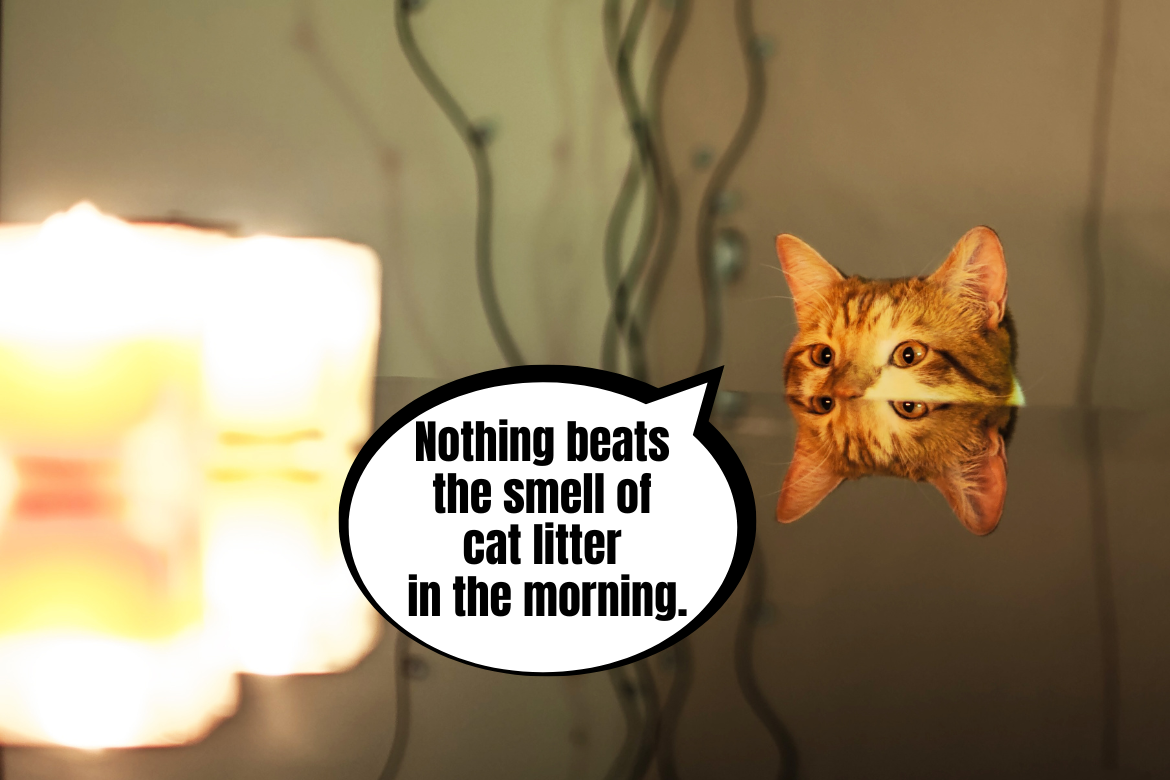Winter, upcoming holidays, long evenings spent under the blanket, with a cup of hot cocoa, cats on your lap, the fireplace lit, and a good book or tv series playing. Sounds good, right? Winter evenings have a lot of charm about them and if you love those vibes as much as we do, fabCat, you surely replenished your supply of scented candles already to boost the mood +10. But as cat Carers we started wondering recently – is lighting scented candles fully safe for our furs? Come and look for answers with us.
How sensitive is cats’ sense of smell?
Sense of smell is undeniably one of the most important senses for our furry friends – cats use it efficiently from the first days of their lives and not just to be able to find the food bowl. The sense of smell plays an important role in marking (cats leave pheromones to mark their territory and leave a message to other cats in the neighborhood), in communication, and, of course, in getting food. And while a human nose has about 20 mln scent receptors, a cat has around 100 mln. Why are we talking about it? Because even if some scents seem to be quite light and barely present for us, cats can perceive them as much more intense.
It’s winter and everyone is looking for their own way of creating a cozy atmosphere at home. Lights, candles, and fireplaces are classic – not only do they provide a soft source of warm light, but also add some warmth and that’s always a plus. However, if we have cats at home, the choice of candles should be a little more thought out. Intense and specific scents could not only irritate the cat but also be plain harmful to them. It doesn’t mean that you have to give up candles completely. But more on that in a moment.
Do cats like Christmas scents?
If cats had something to say on the topic, Christmas would surely smell of catnip, not of a fresh tree, baked apples, dried oranges, and cinnamon. It’s quite possible that they would get rid of the last one completely – as it turns out, cats don’t like citrus, cinnamon, and many other scents that we associate with Christmas and which we, hoomans, love so much. Why?
It mostly comes down to the intensity of the smell. Due to cats’ fantastic sense of smell, the sharp smell of cinnamon or t zesty citrus fruits is simply too strong for the little felines. What cats do like is the natural smell of freshly cut tree branches and hay that we put on the Christmas Eve table. There’s a big chance that during all your Christmas preparations you won’t be seeing your cats in the kitchen while you bake gingerbread cookies, but when you start putting up the Christmas tree or greenery on your window sills, cats will be first to investigate the new decorations.
And now a side note: it’s a myth that cats avoid anything that could harm them or be toxic to them. Their curious nature draws cats to scents they find interesting. Meanwhile, biting on a Christmas tree or mistletoe is very dangerous for cats and it’s better to avoid it if you don’t want to wait in the emergency room with your cat. Just to be sure, be careful with hay as well – dried grass shouldn’t cause your cat issues quite like biting on a Christmas tree, but excess is never a good thing and you surely don’t want to clean your cat’s puke from under the Christmas table.
Are scented candles safe for cats?
Now let’s go back to the scents. Besides some natural aromas coming from the kitchen or from the green decorations around the house, Christmas time always makes us want to make our houses feel cozy with the addition of scented candles. Ones that are made with winter in mind usually smell of a forest, cardamom, cinnamon and gingerbread spices, citrus fruit, vanilla, and cloves – we feel warmer already just thinking about an evening with a blanket and those lovely smells! And here’s the first issue – if we pick a candle that’s too intense, cats can simply get their butts up and get out of the room where the candle is burning. Lounging with cats on your lap is no longer an option.
The other issue and a potential threat to a cat’s safety are the ingredients of a candle. It’s been long known that paraffin wax candles create a lot of harmful toxins while they’re burning and it’s better not to light them at home. Now let’s think what toxins like this could do to a much smaller and fragile cat’s body. And then we add the issue of smoke – inhaling it is not safe for anyone, and there you have it, a full package of arguments against scented candles. Unfortunately, paraffin wax candles are cheap and easily available, their scent profiles are massive and the colorful, decorative glass they come in is something that draws our eyes to them. How do we say no? All you need is some self-control! For the sake of your own and your cats’ safety, remember: if you like scented candles, pick the soy wax ones as they are much safer for us, our cats, and the environment. You may need to look for them online, but once you find the ones you love, you’ll never go back to paraffin wax 🙂
A few safety rules if you love candles (and cats)
To close things off, we prepared a quick cheat sheet with safety rules for when you want to light candles at home, but also live with cats. Most of them might seem obvious but we can guarantee – with cats, even the most obvious scenarios can surprise you.
- Keep your candles away from your cats. Cats and fire don’t mix well and the flame that’s flickering inside the glass jar is a hypnotizing sight for most cats. If you plan on lighting a candle in your home, make sure you keep an eye on it at all times (that’s a general safety rule, whether you have cats or not) and put it where your cat won’t be able to jump to.
- Remember to open your windows. This might seem counterproductive if you’re lighting a scented candle and want to be able to smell it around the house. However, we must remember that some scents might be too intense and the smoke after you blow the candle out is irritating for cats. Burn your candles only in well-ventilated rooms and remember to air the room out once you blow the candle out.
- Pay attention to your cat’s health. It’s not recommended to burn candles if your cats suffer from asthma, have breathing issues, or are brachycephalic, which means their nose is small and short – the airways of such breeds have a lot to do without the additional obstacles like smoke or irritating scents.
- Limit the time. Long winter evenings call for long-burning candles, but for the sake of cats’ safety, it’s better to compromise and limit the amount of time the candles are lit during the day. If you want to keep your home cozy, think about installing lights instead – with Christmas coming soon, the shops are full of various lighting options and decorations that will easily substitute your candles and, as a bonus, won’t get used up as quickly as a candle would.
Did you ever happen to pick up a scented candle and wonder “is it safe for cats?”, fabCat? If you never did, we hope that today’s blog will allow you to make better, more conscious choices in the future. We definitely benefited from all the knowledge we got while preparing today’s article – it’s time to do some candle clearout 🙂




